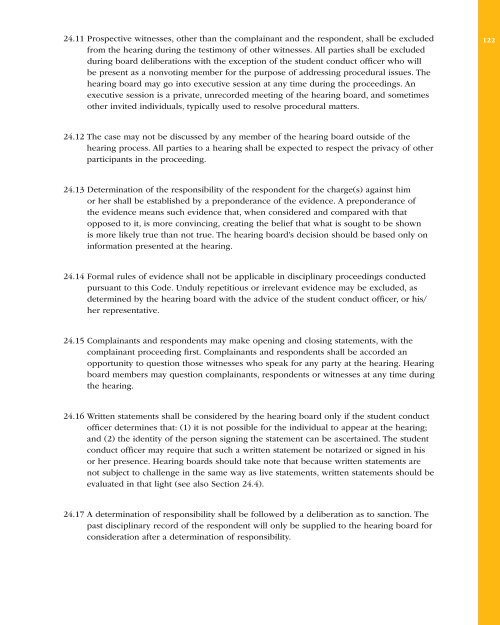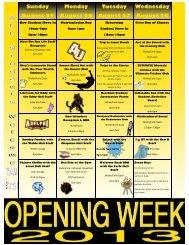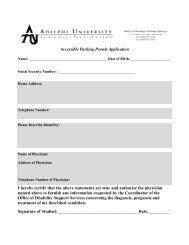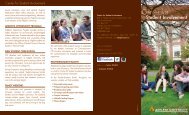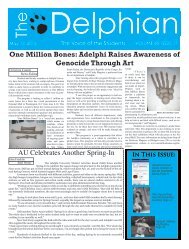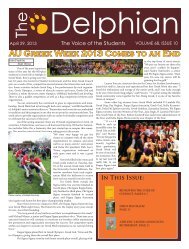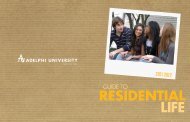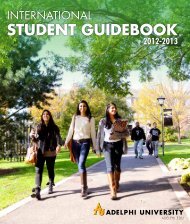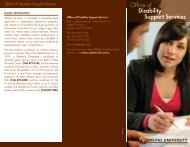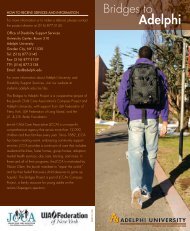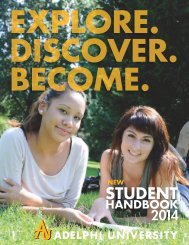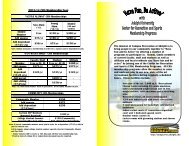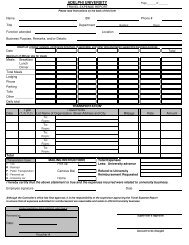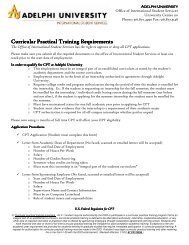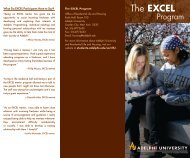Guide to Student Life - Campus Life - Adelphi University
Guide to Student Life - Campus Life - Adelphi University
Guide to Student Life - Campus Life - Adelphi University
Create successful ePaper yourself
Turn your PDF publications into a flip-book with our unique Google optimized e-Paper software.
24.11 Prospective witnesses, other than the complainant and the respondent, shall be excluded<br />
from the hearing during the testimony of other witnesses. All parties shall be excluded<br />
during board deliberations with the exception of the student conduct officer who will<br />
be present as a nonvoting member for the purpose of addressing procedural issues. The<br />
hearing board may go in<strong>to</strong> executive session at any time during the proceedings. An<br />
executive session is a private, unrecorded meeting of the hearing board, and sometimes<br />
other invited individuals, typically used <strong>to</strong> resolve procedural matters.<br />
122<br />
24.12 The case may not be discussed by any member of the hearing board outside of the<br />
hearing process. All parties <strong>to</strong> a hearing shall be expected <strong>to</strong> respect the privacy of other<br />
participants in the proceeding.<br />
24.13 Determination of the responsibility of the respondent for the charge(s) against him<br />
or her shall be established by a preponderance of the evidence. A preponderance of<br />
the evidence means such evidence that, when considered and compared with that<br />
opposed <strong>to</strong> it, is more convincing, creating the belief that what is sought <strong>to</strong> be shown<br />
is more likely true than not true. The hearing board’s decision should be based only on<br />
information presented at the hearing.<br />
24.14 Formal rules of evidence shall not be applicable in disciplinary proceedings conducted<br />
pursuant <strong>to</strong> this Code. Unduly repetitious or irrelevant evidence may be excluded, as<br />
determined by the hearing board with the advice of the student conduct officer, or his/<br />
her representative.<br />
24.15 Complainants and respondents may make opening and closing statements, with the<br />
complainant proceeding first. Complainants and respondents shall be accorded an<br />
opportunity <strong>to</strong> question those witnesses who speak for any party at the hearing. Hearing<br />
board members may question complainants, respondents or witnesses at any time during<br />
the hearing.<br />
24.16 Written statements shall be considered by the hearing board only if the student conduct<br />
officer determines that: (1) it is not possible for the individual <strong>to</strong> appear at the hearing;<br />
and (2) the identity of the person signing the statement can be ascertained. The student<br />
conduct officer may require that such a written statement be notarized or signed in his<br />
or her presence. Hearing boards should take note that because written statements are<br />
not subject <strong>to</strong> challenge in the same way as live statements, written statements should be<br />
evaluated in that light (see also Section 24.4).<br />
24.17 A determination of responsibility shall be followed by a deliberation as <strong>to</strong> sanction. The<br />
past disciplinary record of the respondent will only be supplied <strong>to</strong> the hearing board for<br />
consideration after a determination of responsibility.


